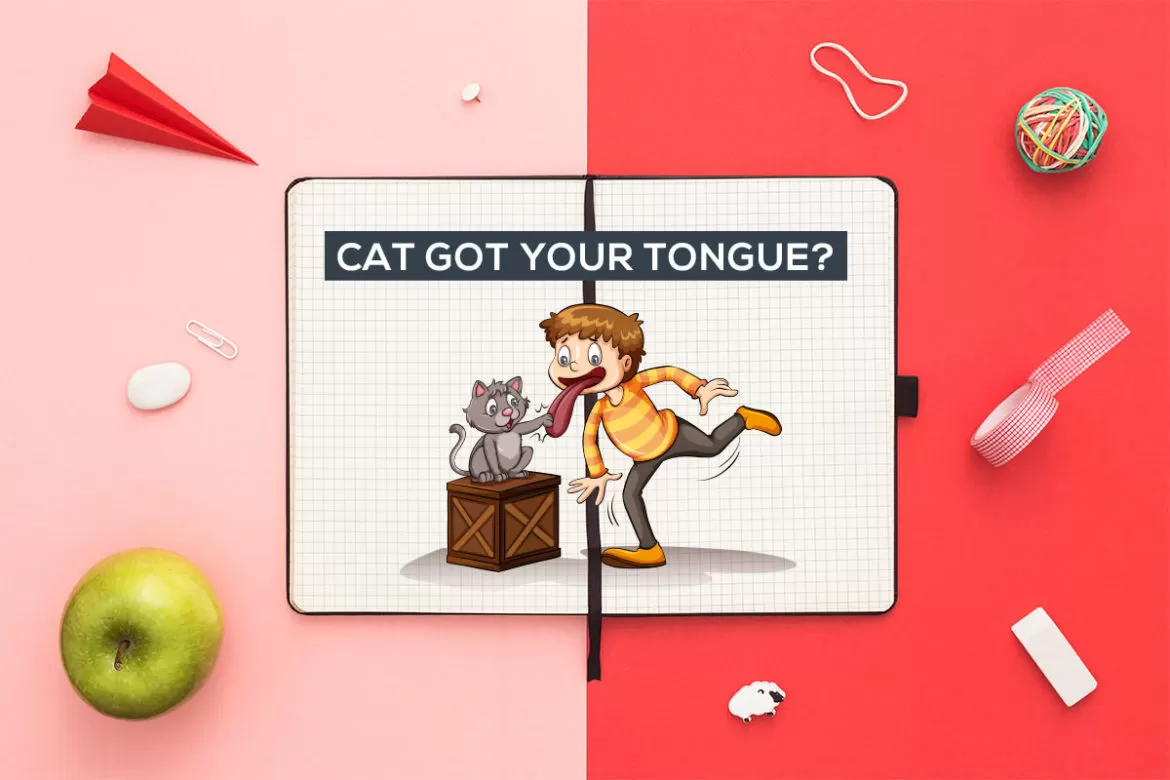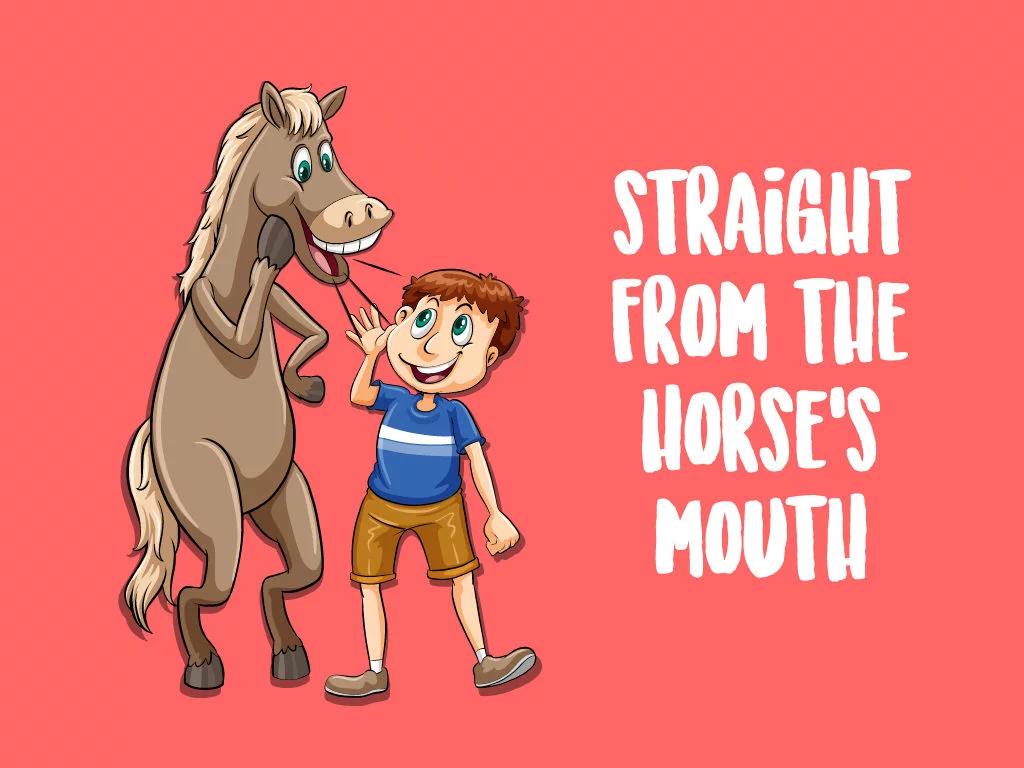From ‘bite the bullet’ to ‘break the ice’ do you know the history behind these idioms and their origins? Find out the fascinating stories behind 30 English idioms and phrases that you use every day.
At work you will probably need to ‘meet a deadline’ before lunch, or ‘butter up’ your boss before asking for a raise. Do you look forward to ‘letting your hair down’ at the end of the day? Or maybe you want to ‘break the ice’ with that cute guy or girl that you spotted on the train home. On any given day you’re unknowingly using numerous amounts English expressions.
There are literally thousands of expressions across all languages, that we take for granted and give no thought as to their origins. More often than not, their explanations are truly fascinating and allow us to step back in time to when people’s lives were very different from our own today.
As you will discover, many phrases stem from such things as social class, historical events, sport, and religion.
Here are some of the most interesting!
1. Bite the bullet
Meaning: To endure something difficult or unpleasant.
Origin: This expression was first recorded in the 1891 novel, in The Light that Failed. It is said to have derived from the practice of having a patient clench a bullet between their teeth as a way to cope with the extreme pain felt during a surgical procedure without anaesthetic. It has also been suggested to have evolved from the British empire expression ‘to bite the cartridge’, dating back to the Indian Rebellion of 1857. In addition, the phrase ‘chew a bullet’, holds a similar meaning and dates back to at least 1796.
2. Break the ice
Meaning: To end conflict or initiate friendship.
Origin: This phrase originates from the 1580s, referring to the carving of ice to create passages for ships on trade routes. Oftentimes, the ships would get stuck in the ice during the winter. The receiving country would send small ships to ‘break the ice’ in order to make way for the trade ships.
3. Butter someone up
Meaning: To praise or flatter someone excessively.
Origin: In ancient India, is was custom to throw butterballs of ghee (clarified butter commonly used in Indian cooking) at the statues of the gods to seek favour and forgiveness. Similarly, a Tibetan tradition dating back to the Tang Dynasty (618–907) involves the creating sculptures from butter for the New Year with the belief that such offerings would bring peace and happiness during the full lunar year.
4. Cat got your tongue?

Origin: There are two possible sources for this phrase, both equally morbid, sadly. The first one refers to the use of the whip, cat-o’-nine-tails. Used by the English Navy, victims were left speechless from the pain inflicted upon them after a flogging.
The second possible source comes from medieval times. Liars and blasphemers were punished by having their tongues cut out and then fed to cats. In ancient Egypt, cats were considered to be gods and it was seen an offering to the gods to give them the tongue of a liar.
5. Turn a blind eye
Meaning: To ignore something.
Origin: During the Battle of Copenhagen in 1801, the commander of British forces, Admiral Sir Hyde Parker, signalled to Admiral Horatio Nelson to stop attacking a fleet of Danish ships using a system of signal flags. Nelson raised his telescope up to his blind eye and said, “I really do not see the signal” and continued attacking. After his success, Sir Hyde Parker was disgraced and Nelson became Commander-in-Chief of the fleet.
6. Bury the hatchet
Meaning: To end conflict, and make peace.
Origin: This phrase comes from North America during the 1600’s. During peace talks between the Puritans (a group of English Reformed Protestants) and the Native American. After a peace agreement was made the chiefs of tribes buried all their hatchets, knives, clubs, and tomahawks, thus making all weapons inaccessible.
7. Caught red-handed
Meaning: To be caught in the act of doing something wrong.
Origin: Dating back to Scotland in 1432, this term refers to an old English law that sought the punishment of any person who butchered an animal that wasn’t his own. In order to be convicted, he had to be caught with the animal’s blood still on his hands.
8. Give the cold shoulder
Meaning: Disregarding someone.
Origin: This phrase stems from a particular way food was served to an unwanted guest in medieval England. At the time is was customary to serve a hot meal or roast that was fresh out of the oven. So, the act of serving an inferior cut of meat, such as a cold shoulder of mutton to the guest was a direct and subtle way to communicate that they had overstayed their welcome and should leave.
9. Let one’s hair down
Meaning: To relax or behave in an uninhibited manner.
Origin: This phrase was first reference in John Cotgrave’s, The English Treasury of Wit and Language published in 1655. During the 17th century, women were obliged to wear elegant hair-dos that were normally pinned up. It was only during brushing or washing that their hair was let down. The term used for this at the time was dishevelling. Today, the term dishevelled refers to someone who is untidy, however back then it applied specifically to hair which was unpinned.
10. Pull someone’s leg
Meaning: To trick or fool someone.
Origin: This phrase stems from a method used by street thieves in 18th and 19th century London. Often working in pairs, one thief, known as a “tripper up,” was tasked with tripping up an unsuspecting victim using a cane, rope or piece of wire. The other thief robs the victim as he lay on the ground. Pulling your leg originally referred to the way the “tripper up” tried to make someone stumble. Today it only refers to tripping someone figuratively.
11. Straight from the horse’s mouth
Meaning: From the highest authority or trusted source
Origin: This expression comes from punters in horse racing. Tips on which horse is likely to win are much sought after and circulate amongst punters. But the most trusted authorities are those from the inner circle of the horse, such as stable lads and trainers. The notional ‘from the horse’s mouth‘ is indicates one step even better than even the inner circle, that is, the horse itself.
12. Bust one’s balls
Meaning: A slang term referring to working hard or being punished.
Origin: Believe it or not, this expression arose out of the painful method of castrating a bull’s balls. This common practice involved breaking a calf’s testicles to turn them from a bull to a steer.
13. Bee’s knees
Meaning: Excellence or perfection.
Origin: In 1920s America there was a relatively short-lived trend which involved the pairing of an animal with a body part. That craze spawned a plethora of expressions including elephant’s adenoids, cat’s miaow, ant’s pants, tiger’s spots, elephant’s wrist, eel’s ankles, and bullfrog’s beard just to name a few. Today only three such expressions survived such as bee’s knees, cat’s pyjamas, and dog’s bollocks
14. Let the cat out of the bag
Meaning: Divulge a secret.
Origin: First recorded in the 16th century, this phrase stems from shifty farmers at markets who committed fraud by substituting a cat for a piglet in a bag. If someone let the cat out of the bag, the deceit was uncovered.
15. Burning ears
Meaning: When someone is being talked about.
Origin: In Roman times, it was believed that a tingling or burning sensation in the ears meant that a person was being talked about by others. The ancient belief that the left-hand side signifies evil and the right for good also applies. Therefore, if a person’s right ear was burning then he was being praised, but a burning left ear indicated that he is the subject of evil intent.
16. Pull out all the stops
Meaning: To make a great effort to achieve something.
Origin: This phrase refers to the ‘stops’ or knobs inside a pipe organ. These stops control the loudness and tones of the instrument. When all are pulled out, the organ can play all tones simultaneously, thus achieving the maximum volume possible from the instrument.
17. Steal ones thunder
Meaning: To use someone else’s ideas or inventions to your own advantage.
Origin: The 18th-century playwright, John Dennis, claimed to have invented a device created the sound of thunder for his theatre production Appius and Virginia in London,1704. When his method was copied by rivals for the production of Macbeth, Dennis complained that they had ‘stolen his thunder’.
18. Take the piss
Meaning: To mock or tease.
Origin: One explanation for the origin of this slang phrase comes from the canals in Britain. Before synthetic dyes were invented, urine was collected and used in the process of fixing dye to wool to create such colours as blue. Transporting urine to wool mills wasn’t as lucrative as transporting wine, so when the boatmen were questioned what they were carrying they would lie, saying “I’m taking wine”. Anyone suspecting otherwise might ask if he was, ‘taking the piss’.
20. Up to scratch
Meaning: To be acceptable.
Origin: In the early days of boxing, there was no bell to signal the beginning of a round. Instead, the referee would scratch a line on the ground between fighters, and the round began when both men stepped over it. A contestant who had been knocked down had to demonstrate that he was fit to continue by walking up to the scratch. If the boxer wasn’t able to, he was considered unfit to continue the fight, ‘not up to scratch‘. The fight was awarded to his opponent.
21. Eat humble pie
Meaning: To admit you were wrong or apologise.
Origin: In the 14th century during a post-hunt feast, the lord of the manor would eat the finest cuts of meat. The numbles was the name given to the heart, liver, and entrails of animals. By the 15th century this was shortened to ‘umbles. It was common practice for people of lower stature to be humiliated when served the ‘umbles baked into a pie. Thus, comes the term, ‘to eat humble pie’.
22. Bottoms up!
Meaning: Express friendly feelings towards one’s companions before drinking.
Origin: During the 18th and 19th centuries, English Navy recruiters would coerce London drinkers in dockside pubs to join the service. Accepting the ‘King’s shilling’ was proof that an agreement had been made to join the service. Dishonest recruiters would slip a shilling into the pint of a drunken man who wouldn’t notice until he had finished his beverage. The victim would then be dragged away and wake up on board a ship far out to sea, unaware of what had happened to him the night before.
When drinkers and pubs became aware of the scam, they introduced tankards with transparent bases. Customers were reminded to lift the pint up and check the bottom for illicit shillings before they began drinking.
23. Run amok / amuck
Meaning: Behave in an unruly manner.
Origin: This expression comes from the Malaysian word amoq. When translated literally it describes the behaviour of tribesmen who, under the influence of opium, became wild and attacked anybody in their path. During the 17th century, the phrase became popular in England when travellers would try to impress people with their knowledge of foreign cultures.
24. The writing is on the wall
Meaning: A clear sign that something unpleasant is going to happen.
Origin: This phrase can be traced back to the Bible. In the Book of Daniel, God punishes King Belshazzar for indulging in a drunken revelry and degrading sacred temple vessels by using them as wine goblets. God sends this hand to write the words ‘mene mene tekel upharsin’ on the palace wall, which foretell Belshazzar’s downfall. Unable to interpret the message, Belshazzar’s sends for Daniel to interpret it. Belshazzar couldn’t see the obvious warning that was apparent to others because he was so engrossed in his sinful behaviour.
25. Cost and arm and a leg
Meaning: To be expensive.
Origin: The cost of having your portrait painted in the 18th century wasn’t based on how many people in the picture, but by how many limbs were to be painted. The cheapest option was to have only your head and shoulders painted. The price increased as the portrait became larger with the inclusion of arms. A top of the range portrait included the legs.
26. Burn the midnight oil
Meaning: To work late into the night.
Origin: When people still used oil lamps for lighting, the most desirable and expensive of oils was whale oil. To ‘burn the midnight oil’ meant that you had a project that was so important that you burned your expensive oil in your lamp late into the night in order to complete it.
27. Get the sack
Meaning: Be fired from a job.
Origin: In the 1500’s, tradesmen carried all their belongings and tools around in a sack that they would leave in a safe place or in the boss’s office. At the end of their shift, they were allowed to go in and pick it up. However, if the boss was displeased with their work, he would literally ‘give them their sack’.
28. Take with a pinch of salt
Meaning: To accept something while maintaining a degree of scepticism.
Origin: First recorded in the English language back in 1647, this phrase stems from an ancient Roman belief. The idea was that food was more easily swallowed if taken with a small amount of salt. Pliny the Elder translated an ancient poison antidote with the words ‘be taken fasting, plus a grain of salt’. The Romans believed that adding a grain of salt would protect them from a lethal poisoning.
29. A bigwig
Meaning: An important person.
Origin: In the 17th century, wig-wearing was at its peak. It was fashionable for people to keep their hair short, or even shave their head in order to wear a wig sporting a style that they couldn’t grow naturally. Hair was sold by the strand and was very expensive. While it was common to see the lower class wearing wigs with only several strands of hair, the richer upper class were able to buy large wigs consisting of thousands of strands of hair. The term ‘bigwig’ quickly became associated with a rich person.
30. Meet a deadline
Meaning: To finish something in time.
Origin: This phrase has sinister origins, first appearing during the American Civil War (1861-1865). A line was drawn 20 feet from the inside wall of the stockade where Federal prisoners of war were kept. This line set the boundaries for the prisoners and was known as a deadline because any prisoner who attempted to cross it was shot.
If you liked this, don’t miss these!
- 9 Perfectly Correct English Phrases That Will Break Your Brain
- 20 Hidden Meanings of English Place-Names You Probably Didn’t Know
- 31 Fascinating Origins of London Street Names Revealed
- 10 Unusual Things to do in London You Never Knew About
- 10 Bizarre Ways to Say ‘LOL’ in Different Languages
- Blond or Blonde: Why Do Genders in English Exist?
- 25 Wonderful Phrases Shakespeare Invented that You Use Every day
- Transatlantic Accent: Why Did Actors in Old Movies Have Weird Accents?
- 15 Country Flags and their Hidden Meanings You Won’t Be Able to Un-see
Like it? Pin it for later!
Sources:
Wikipedia – English Idioms
Wikipedia – Cold Shoulder
One Stop English – Pull someones leg
One Stop English – Get the sack
Today I Found Out – Deadline
Wikipedia – Bust balls
Womans Day
Phrases – Arm and a leg
Phrases – From the horse’s mouth
Stack Exchange – Bee’s knee’s
Stack Exchange – Burning ears
Davidsidhu – Bigwig
Book – 1000 English Idioms Explained
All That is Interesting
Over to you!
Which one of these English expressions surprised you the most? Do you know the origin of any others?
Let me know using the comments section below or join me on social media to start a conversation.
Thanks for reading and I hope you enjoyed this post.
Like what you see? Subscribe using the form below to have all of my posts delivered directly to your email.




2 comments
Great article! I am using this as a journal entry for my students – they are researching each one. The first one I did was about the “real McCoy” – that one has a few origins supposedly but this makes for interesting research and relevance to my students. Thank you Michelle….looking forward to reading about Hebrew from your blog – I am Israelli and speak three languages.
Thank you so much, Ayala. I’m so happy you enjoyed it and that you’ll be using it with your students 🙂 That’s wonderful!